11 downloads
Title of document: Scaling up agroecology initiative transforming food and agricultural systems in Support of the SDGS Authors: FAO Journal’s name if any: Ministry/Government Agency/Organisation: FAO Year of publication: 2018 Geographic focus: Asia & Mekong regional Main issues / topics addressed (for example: The document responds to four key questions: “What is the potential of agroecology to contribute to the 2030 Agenda?” ; “What are the key challenges and opportunities to scale-up agroecology?” ; “Which core areas of work should the Scaling up Agroecology Initiative focus on?”; and “What is the way forward for the Scaling up Agroecology Initiative?”…) School of agroecology (if any): Web address to original document (if any): Summary: A proposal prepared for the international symposium on agroecology 3-5 April 2018 This document presents the Scaling up Agroecology Initiative, a vision to bring agroecologya to scale and transform food and agricultural systems to achieve the SDGs. The document responds to four key questions: “What is the potential of agroecology to contribute to the 2030 Agenda?” ; “What are the key challenges and opportunities to scale-up agroecology?” ; “Which core areas of work should the Scaling up Agroecology Initiative focus on?”; and “What is the way forward for the Scaling up Agroecology Initiative?”. Read More
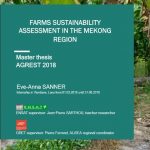
5 downloads
Title of document: Farms Sustainability Assessment in the Mekong Region Authors: Eve-Anna SANNER Journal’s name if any: Ministry/Government Agency/Organisation: GRET, ENSAT Year of publication: 2018 Geographic focus: Asia & Mekong regional Main issues / topics addressed (for example: Context of the study; Sustainability assessment of farms in the Mekong Region; Data collection; Results…) School of agroecology (if any): Web address to original document (if any): Summary: This report is divided into five parts. Firstly, an in-depth description of the context of the case study will be given, then the methodology of the study will be presented. This will be followed by an analysis of collected data, as well as subsequent results. The final part is dedicated to discussions and perspectives of the study. Read More
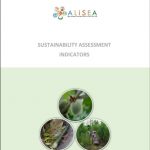
6 downloads
Title of document: ALiSEA Sustainability Assessment indicators Authors: ALiSEA Journal’s name if any: Ministry/Government Agency/Organisation: ALiSEA Year of publication: 2018 Geographic focus: Asia & Mekong regional Main issues / topics addressed (for example: Overview table of indicators per dimension and themes; Methodological sheets-Agroecological dimension; Methodological sheets-Social dimension…) School of agroecology (if any): Web address to original document (if any): Summary: The ALiSEA Sustainability Assessment Framework begins with the three dimensions of sustainability: agroecology, social and economic. These dimensions are broad, encompass many aspects and are translated into a set of themes. Each theme is measurable through indicators. SA Indicators document provides the guidance for the application and calculation of these indicators. Read More
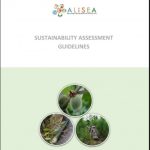
4 downloads
Title of document: ALiSEA Sustainability Assessment Guideline Authors: ALiSEA Journal’s name if any: Ministry/Government Agency/Organisation: ALiSEA Year of publication: 2018 Geographic focus: Asia & Mekong regional Main issues / topics addressed (for example: Framework: Purpose of sustainability assessment; Choice of indicators and calculation …) School of agroecology (if any): Web address to original document (if any): Summary: ALiSEA Sustainability Assessment is derived from an existing sustainability assessment tool called IDEA. The IDEA method (Indicateurs de Durabilité des Exploitations Agricoles or Indicators of Sustainable Farm Development) was created upon request of the General Board for Education and Research of the French Ministry of Agriculture which, since 1996, aims at assessing and diagnosing the sustainability of agricultural systems. The purpose of ALiSEA SA is to assess farms led by young farmers in the Mekong Region on a common framework based on the three dimensions of sustainability. Using a harmonized approach contributes to making sustainable farms more measurable, verifiable and visible. Read More
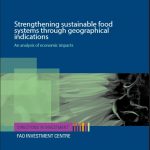
8 downloads
Title of document: Strengthening sustainable food systems through geographical indications Authors: Emilie Vandecandelaere; Catherine Teyssier; Dominique Barjolle; Philippe Jeanneaux; Stéphane Fournier; Olivier Beucherie Journal’s name if any: Ministry/Government Agency/Organisation: FAO/EBRD Year of publication: 2018 Geographic focus: Asia & Mekong regional Main issues / topics addressed (for example: Background: what does the literature have to say about geographical indications and their impacts?; Framework of analysis; GI processes and their economic impacts; Synthesis of causal mechanisms and success factors …) School of agroecology (if any): Web address to original document (if any): www.fao.org/3/I8737EN/i8737en.pdf Summary: This study seeks to provide empirical evidence on the economic impacts that are generated through the GI process, beginning with the official recognition of a GI and the steps that follow. It focuses on the food sector and reviews nine cases, offering a variety of national contexts and local value chains. The approach considers “operational” GI processes: those in which a code of practice (or specifications) is defined and the GI is used and managed by a collective organization. The cases are: Colombian coffee, Darjeeling tea (India), Futog cabbage (Serbia), Kona coffee (United States), Manchego cheese (Spain), Penja pepper (Cameroon), Taliouine saffron (Morocco), Tête de Moine cheese (Switzerland) and Vale dos Vinhedos wine (Brazil). A specific methodological framework (detailed in the annex) has been developed based on qualitative and quantitative analysis of each case thanks to field work carried out by Masters and PhD students, so as to identify the economic impacts of GI processes and define the mechanisms involved. Read More
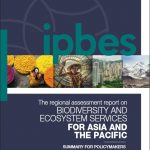
5 downloads
Title of document: Assessment Report on Biodiversity and Ecosystem Services for Asia and the Pacific Authors: Madhav Karki (co-chair, Nepal), Sonali Senaratna Sellamuttu (co-chair, Sri Lanka); Sana Okayasu (IPBES), Wataru Suzuki (IPBES); Lilibeth A. Acosta (Philippines/Germany), Yousef Alhafedh (Saudi Arabia), Jonathan A. Anticamara (Philippines), Anne-Gaëlle Ausseil (New Zealand), Kirsten Davies (Australia), Alexandros Gasparatos (Greece/Japan), Haripriya Gundimeda (India), Faridah-Hanum Ibrahim (Malaysia), Ryo Kohsaka (Japan), Ritesh Kumar (India), Shunsuke Managi (Japan), Wu Ning (China), Asha Rajvanshi (India), Gopal S. Rawat (India), Philip Riordan (United Kingdom of Great Britain and Northern Ireland), Shyam Sharma (India), Amjad Virk (Pakistan), Changyong Wang (China), Tetsukazu Yahara (Japan), Youn Yeo-Chang (Republic of Korea). Journal’s name if any: Ministry/Government Agency/Organisation: IPBES Year of publication: 2018 Geographic focus: Asia & Mekong region Main issues / topics addressed (for example: …) School of agroecology (if any): Web address to original document (if any): https://www.ipbes.net/assessment-reports/asia-pacific Summary: Summary for policymakers of the IPBES regional assessment report on biodiversity and ecosystem services for Asia and the pacific Read More
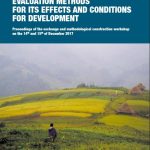
9 downloads
Title of document: Agro-ecology: evaluation methods for its effects and conditions for development Authors: GTAE Journal’s name if any: Ministry/Government Agency/Organisation: GTAE, AFD and FFEM Year of publication: 2017 Geographic focus: Asia & Mekong region Main issues / topics addressed (for example: …) School of agroecology (if any): Web address to original document (if any): Summary: Proceedings of the exchange and methodological construction workshop on the 14th and 15th of December 2017 This paper is intended to present the work carried out during the seminar held on the 14th and 15th of December 2017 by the work group on agroecological transitions (GTAE) and is devoted to the evaluation methods of agroecology. Read More
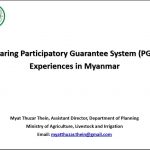
21 downloads
Title of document: Sharing Participatory Guarantee System (PGS) Experiences in Myanmar Authors: Myat Thuzar Thein Journal’s name if any: Ministry/Government Agency/Organisation: MOALI Year of publication: 2018 Geographic focus: Myanmar Main issues / topics addressed (for example: Overview of PGS; Current Status; Strategies for developing PGS; Supporting PGS and Organic Agriculture …) School of agroecology (if any): Web address to original document (if any): Summary: The presentation for Regional experience sharing workshop “Participatory Guarantee Systems (PGS) to promote agroecology in the Mekong Region” 1st to 3rd October 2018, Vientiane Capital, Lao PDR. Read More
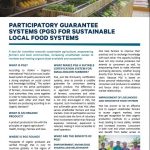
1 download
Title of document: Participatory Guarantee Systems (PGS) for sustainable local food systems Authors: IFOAM and FAO Journal’s name if any: Ministry/Government Agency/Organisation: FAO and IFOAM Year of publication: 2017 Geographic focus: Lao PDR&Cambodia Main issues / topics addressed (for example: the story of Ms Bouchan: women’s economic empowerment; The story of Ms Sinsanga and Mr Sengsavang: spreading knowledge about organic farming; The story of Ms Sophal and Mr An: organic vegetables for village markets…) School of agroecology (if any): Web address to original document (if any): http://www.fao.org/search/en/?cx=018170620143701104933%3Aqq82jsfba7w&q=Participatory+Guarantee++Systems+%28PGS%29+in+Lao+PDR+&cof=FORID%3A9&siteurl=www.fao.org%2Fhome%2Fen%2F&ref=www.google.co.th%2F&ss=73j5329j2 Summary: Participatory Guarantee Systems (PGS) story from Lao PDR and Cambodia by FAO and IFOAM Read More
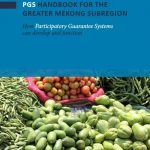
1 download
Title of document: PGS Handbook for the Greater Mekong Sub Region: How Participatory Guarantee Systems can develop and function Authors: IFOAM Journal’s name if any: Ministry/Government Agency/Organisation: ADB, Greater Mekong Sub Region, IFOAM, FAO Year of publication: 2017 Geographic focus: Asia & Mekong region Main issues / topics addressed (for example: Background; Key elements and compliance; Structure and organization; Final Remarks and Recommendations …) School of agroecology (if any): Web address to original document (if any): https://www.ifoam.bio/sites/default/files/pgs_handbook_gms.pdf Summary: This publication builds on the IFOAM PGS Guidelines, a publication that was first commissioned and funded by IFOAM – Organics International through its “IFOAM - Organics International - Growing Organic” program (I-GO), funded by Hivos, Netherlands and the “Fund for Sustainable Biodiversity Management” of the Dutch Government. The publication was revised and adapted for the Greater Mekong Subregion from 2014 to 2016 with support from the Asian Development Bank (ADB) in the framework of the TA 8163 PGS project and the Food and Agriculture Organization of the United Nations (FAO) in the framework of the TCP/RAS/3510. Read More

 Asia & Mekong Region
Asia & Mekong Region  Cambodia
Cambodia  Laos
Laos  Myanmar
Myanmar  Other
Other  Vietnam
Vietnam